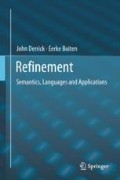Abstract
In the previous parts of the book, basic refinement relations were introduced semantically and for a variety of specification languages. This chapter starts the task of relating these different refinement relations by defining corresponding processes for ADT specifications, as well as process semantics for ADT specifications, and providing theorems relating refinement relations across formalisms via such embeddings.
Access this chapter
Tax calculation will be finalised at checkout
Purchases are for personal use only
Notes
- 1.
See [1].
- 2.
This condition is left implicit in the rest of this chapter.
References
Derrick J, Boiten EA (2003) Relational concurrent refinement. Form Asp Comput 15(1):182–214
Schneider S (2006) Non-blocking data refinement and traces-divergences semantics, personal communication
Bolton C, Davies J (2002) Refinement in Object-Z and CSP. In: Butler M, Petre L, Sere K (eds) Integrated formal methods (IFM 2002). Lecture notes in computer science, vol 2335. Springer, Berlin, pp 225–244
Bolton C, Davies J (2006) A singleton failures semantics for communicating sequential processes. Form Asp Comput 18(2):181–210
Josephs MB (1988) A state-based approach to communicating processes. Distrib Comput 3:9–18
Boiten EA, Derrick J (2002) Unifying concurrent and relational refinement. In: Derrick J, Boiten EA, von Wright J, Woodcock JCP (eds) ENTCS. Proceedings REFINE’02, vol 70
Reeves S, Streader D (2008) Data refinement and singleton failures refinement are not equivalent. Form Asp Comput 20(3):295–301
Boiten EA, Derrick J, Schellhorn G (2009) Relational concurrent refinement II: internal operations and outputs. Form Asp Comput 21(1–2):65–102
Derrick J, Boiten EA (2008) More relational refinement: traces and partial relations. Electron Notes Theor Comput Sci 214:255–276 (Proceedings of REFINE, Turku, 2008)
Boiten EA, Derrick J (2009) Modelling divergence in relational concurrent refinement. In: Leuschel M, Wehrheim H (eds) IFM 2009: Integrated formal methods. Lecture notes in computer science, vol 5423. Springer, Berlin, pp 183–199
Bolton C (2002) On the refinement of state-based and event-based models. PhD thesis, University of Oxford
van Glabbeek RJ (2001) The linear time - branching time spectrum I. The semantics of concrete sequential processes. In: Bergstra JA, Ponse A, Smolka SA (eds) Handbook of process algebra. Amsterdam, North-Holland, pp 3–99
Bolton C, Lowe G (2005) A hierarchy of failures-based models: theory and application. Theor Comput Sci 330(3):407–438
Bolton C, Lowe G (2003) A hierarchy of failures-based models. In: Corradini F, Westmann U (eds) Proceedings of express 2003: 10th international workshop on expressiveness in concurrency. Elsevier Science Publishers, Amsterdam
Reeves S, Streader D (2006) State- and event-based refinement. Technical report, University of Waikato, Department of computer science, University of Waikato, New Zealand
Lynch N, Tuttle M (1989) An introduction to input/output automata. CWI Q 2(3):219–246
Tretmans J (1996) Test generation with inputs, outputs, and quiescence. In: Margaria T, Steffen B (eds) Second international workshop on tools and algorithms for the construction and analysis of systems (TACAS’96). Lecture notes in computer science, vol 1055. Springer, Berlin, pp 127–146
Lynch N, Vaandrager FW (1995) Forward and backward simulations I: untimed systems. Inf Comput 121(2):214–233
Segala R (1997) Quiescence, fairness, testing, and the notion of implementation. Inf Comput 138(2):194–210
Segala R (1993) Quiescence, fairness, testing, and the notion of implementation (extended abstract). In: International conference on concurrency theory, pp 324–338
Vaandrager FW (1991) On the relationship between process algebra and input/output automata. Logic in computer science, pp 387–398
de Nicola R, Segala R (1995) A process algebraic view of I/O automata. Theor Comput Sci 138:391–423
Author information
Authors and Affiliations
Corresponding author
Rights and permissions
Copyright information
© 2018 Springer International Publishing AG, part of Springer Nature
About this chapter
Cite this chapter
Derrick, J., Boiten, E. (2018). Relational Concurrent Refinement. In: Refinement. Springer, Cham. https://doi.org/10.1007/978-3-319-92711-4_9
Download citation
DOI: https://doi.org/10.1007/978-3-319-92711-4_9
Published:
Publisher Name: Springer, Cham
Print ISBN: 978-3-319-92709-1
Online ISBN: 978-3-319-92711-4
eBook Packages: Computer ScienceComputer Science (R0)

